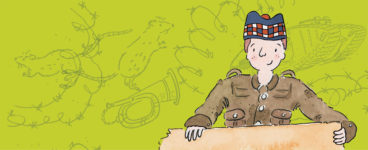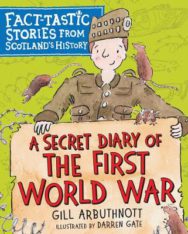‘The more I wrote, the more fascinated I became. Reading James’ words made me see the war, for the first time, from the inside.’
Author Gill Arbuthnott discusses how a young soldier’s war diary proved to be the magic key to telling the story of the Great War for young readers.
A Secret Diary of the First World War
By Gill Arbuthnott, illustrated by Darren Gates
Published by Kelpies
Everyone wants to make a connection with a book when they read. When you enjoy a novel, it can be because you fall in love with a character, or find your mind engaged by an intricate plot, or the story is set somewhere you know well.
When writing non-fiction, engaging the reader can be more challenging. In most cases, the topic is the main reason that someone will pick up a non-fiction book, but how can the author keep them reading?
I like to write narrative non-fiction – stories that are factually accurate but also entertain. When I began to write A Secret Diary of the First World War, my intention was to structure it round the imagined diary of a young Scottish soldier on the Western Front, based on extracts from already published letters and diaries of the period. But, after being put in touch with staff at the Royal Scots Museum at Edinburgh Castle, I found I didn’t need to. The perfect document already existed – and it gave me a local connection that would intrigue many readers.
James Marchbank was born in Dalkeith, near Edinburgh in 1900. Aged just 14, he joined the 1/8th Battalion, Royal Scots, part of the Territorial Forces, as a bugler and drummer. Territorial Forces battalions were allowed to enlist boys of this age as buglers, so James was called up – legally – on August 4th 1914. He spent most of the war on the Western Front, and kept a diary of his experiences. Both James and his diary survived to come home and his family preserved his written account, along with other memorabilia of James’ war. Luckily for me, they were happy for me to use the diary as the basis for my book.
The diary was the magic key I needed to find a way to tell the story of the Great War for young readers. Here was someone they could empathise with: a schoolboy from a Scottish village. His account of the war included anecdotes that provided the perfect introduction to information about trench life, weapons, patriotism, war in the air, and many other topics.
The more I wrote, the more fascinated I became. Reading James’ words made me see the war, for the first time, from the inside. This young man more or less grew up in the trenches, experiencing fear, hardship and death on a scale that can be difficult for us to comprehend at this distance, and this is what I have tried to convey to the reader.
This single, local story has universal relevance. Through James’ story, I hope that school pupils who can no longer ask relatives ‘What did you do in the war?’ will be able to gain some understanding of what was involved for the young men and women who fought, or supported the war effort in other ways, and to consider how they might have responded to such an extraordinary challenge.
Now that the story is written, I can’t wait to introduce James and his experiences to the world. That process begins in August, when I’ll be talking about the book at the Edinburgh International Book Festival – the best start A Secret Diary of the First World War could possibly have.
Step into the boots of real-life boy soldier James Marchbank in A Secret Diary of the First World War. Gill Arbuthnott and illustrator Darren Gate mix James’s story with timelines, letters, and diagrams to create a story that is both fun and emotionally engaging for younger readers.
It’s the first book in the brand new Fact-Tastic Stories from Scotland’s History series, which brings together the most exciting, gruesome and critical moments of Scottish history alive for young readers.
Gill Arbuthnott and Darren Gate will appear at The Boy Who Went to War at the Edinburgh International Book Festival on Monday 13th August, 10.30am.
ALSO IN THIS ISSUE

 Bringing a Local Story to the World Stage
Bringing a Local Story to the World Stage
‘The more I wrote, the more fascinated I became. Reading James’ words made me see the war, for the f …

 Edinburgh on Foot: apps, maps and books
Edinburgh on Foot: apps, maps and books
‘In August, when the streets are full of festival crowds, take a walk through its literary heritage. …













